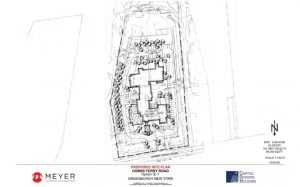The former site of Frank”™s Nursery & Crafts in the town of Greenburgh may finally see its long-awaited cleanup and redevelopment.
Capitol Seniors Housing, the developer negotiating the $3.5 million purchase and sale agreement for the property, plans to construct a 101-unit senior housing facility on the vacant site, a use that is in line with existing zoning. The developer presented initial plans at a town board work session earlier this month to build the three-story, 90,651-square-foot building on roughly 7 acres at 715 Dobbs Ferry Road.
“We think that the use will fit very nicely into the Dobbs Ferry Road corridor,” said David Steinmetz of Zarin & Steinmetz, a representative of the developer. “We don”™t believe it will create any adverse impacts.”
The property was contaminated in 2001 by 500 gallons of carcinogenic No. 2 fuel oil and will need to undergo a roughly $1.5 million environmental cleanup before the residences can be built. Capitol has applied to New York state”™s Brownfield Cleanup Program.
“That is all part of the overall transaction, which will result in an environmental cleanup and remediation of the site, repurposing it, putting it back on the tax rolls, making it productive and bringing a wonderful new for-profit, tax-paying entity to the town,” Steinmetz said.
The senior housing will consist of 71 assisted living rooms, five of which will be affordable, and 30 memory-care units. Assisted living units will include studio, one- and two-bedroom floor plans ranging from 350 to 900 square feet, while studio and one-bedroom memory care units will range from 350 to 650 square feet. The development will also provide 67 parking spaces.
“This application probably will be one of the least controversial applications in town history,” Town Supervisor Paul Feiner said, adding that he doesn”™t “know anyone who objects to the proposal.”
Feiner said that neighbors who fought other applicants that had proposed rehabbing the site asked for the development of an assisted living facility, which is permitted under current zoning by a special permit. In contrast to other senior housing proposals that have faced substantial pushback in Westchester County, Capitol”™s proposal has seen virtually no opposition, Feiner said. He attributes this to the property”™s location on a major road near public transportation, one that is not within a residential neighborhood.
The property has seen its fair share of controversy since it was acquired by the town in a 2011 tax foreclosure. Greenburgh received offers from two separate sport facilities for the property. Game On 365 LLC said it would put up $1.7 million for the lot and made a promise to pay $1.3 million over 13 years. Ardsley-based House of Sports offered $3.5 million in an all-cash deal. Both companies threatened lawsuits if the town chose either offer.
The town then hired GA Keen Realty Advisors in 2014 and an auction was scheduled for later that year. Ultimately, plans for the auction fell through after the firm received feedback from bidders who were hesitant to make any offers without knowing more information about the environmental cleanup costs.
After receiving interest from four applicants, the town decided an assisted living facility was most desirable because it would not require rezoning.
For Capitol, the site in Greenburgh was attractive because of the large number of residents in the surrounding area aged 45 to 64, a critical demographic metric for the company.
“That”™s our target audience,” Capitol”™s principal of development Joe McElwee said at the meeting. “Forty-five to 64-year-olds are making decisions for their 85-, 86-year-old parents.”
McElwee added that housing values are high in Greenburgh, leading them to believe those middle-aged children would be wealthy enough to support their aging parents if the need arose.
Founded in 2003, Washington, D.C.-based Capitol has acquired or developed more than 60 senior housing communities since its inception, including communities in New York, New Jersey and Pennsylvania.
Representatives of Capitol say the senior housing facility will provide a residential use that bridges the gap between independent living and nursing care at around half the cost of a nursing home. The senior housing facility will provide residents with meals, exercise programs, personal care and transportation.





















